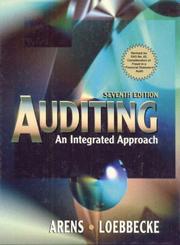| Listing 1 - 10 of 8531 | << page >> |
Sort by
|

ISBN: 0136493858 Year: 1997 Publisher: Englewood Cliffs (N.J.): Prentice Hall
Abstract | Keywords | Export | Availability | Bookmark
 Loading...
Loading...Choose an application
- Reference Manager
- EndNote
- RefWorks (Direct export to RefWorks)
Book
ISBN: 9264422277 Year: 2022 Publisher: Paris : OECD Publishing,
Abstract | Keywords | Export | Availability | Bookmark
 Loading...
Loading...Choose an application
- Reference Manager
- EndNote
- RefWorks (Direct export to RefWorks)
The impact of the work of supreme audit institutions (SAIs) largely depends on the ability and willingness of the audited entities to implement the changes suggested in the audit reports issued by the SAIs. Applying behavioural insights (BI) can help SAIs promote the uptake of their audit reports and recommendations. BI is a perspective based on psychology, cognitive science, and social science that takes into account how humans actually make choices, and can be used to help design better policies. The report analyses how the SAI of Chile, the Comptroller General of the Republic (CGR), produces audit reports and monitors their follow-up. Based on this analysis, the report identifies and discusses challenges hampering the timely follow-up and identifies opportunities to use behavioural insights to address them. Ultimately, a behaviourally informed review of the auditing and follow-up process could help significantly improve the added value of the CGR's work and thus the effectiveness and efficiency of the public administration in Chile.
Book
ISBN: 9264901108 Year: 2022 Publisher: Paris : OECD Publishing,
Abstract | Keywords | Export | Availability | Bookmark
 Loading...
Loading...Choose an application
- Reference Manager
- EndNote
- RefWorks (Direct export to RefWorks)
This report explores ways for Mexico's supreme audit institution, Auditoría Superior de la Federación (ASF), to strengthen its use of analytics. While the report focuses on the use of data to enhance the detection of integrity risks, it also recognises the implications of better analytics for the ASF's broader digital transformation strategy. It offers a range of proposals for enhancing ASF's data governance and embedding analytics into strategic initiatives. It also looks at building ASF's analytics capacity, including addressing integrity considerations through better co-ordination, digital skills development and nurturing a data-centric culture.
Book
Year: 1970 Publisher: Paris: Dunod,
Abstract | Keywords | Export | Availability | Bookmark
 Loading...
Loading...Choose an application
- Reference Manager
- EndNote
- RefWorks (Direct export to RefWorks)
Book
Abstract | Keywords | Export | Availability | Bookmark
 Loading...
Loading...Choose an application
- Reference Manager
- EndNote
- RefWorks (Direct export to RefWorks)
Book
Abstract | Keywords | Export | Availability | Bookmark
 Loading...
Loading...Choose an application
- Reference Manager
- EndNote
- RefWorks (Direct export to RefWorks)
Book
Year: 1966 Publisher: New York (N.Y.): Sir Isaac Pitman,
Abstract | Keywords | Export | Availability | Bookmark
 Loading...
Loading...Choose an application
- Reference Manager
- EndNote
- RefWorks (Direct export to RefWorks)
Book
ISBN: 2708108301 9782708108301 Year: 1987 Publisher: Paris: Éditions d'organisation,
Abstract | Keywords | Export | Availability | Bookmark
 Loading...
Loading...Choose an application
- Reference Manager
- EndNote
- RefWorks (Direct export to RefWorks)
Book
Year: 1957 Publisher: London: Pitman,
Abstract | Keywords | Export | Availability | Bookmark
 Loading...
Loading...Choose an application
- Reference Manager
- EndNote
- RefWorks (Direct export to RefWorks)
Book
Year: 1959 Publisher: Paris: Dunod,
Abstract | Keywords | Export | Availability | Bookmark
 Loading...
Loading...Choose an application
- Reference Manager
- EndNote
- RefWorks (Direct export to RefWorks)
| Listing 1 - 10 of 8531 | << page >> |
Sort by
|

 Search
Search Feedback
Feedback About UniCat
About UniCat  Help
Help News
News